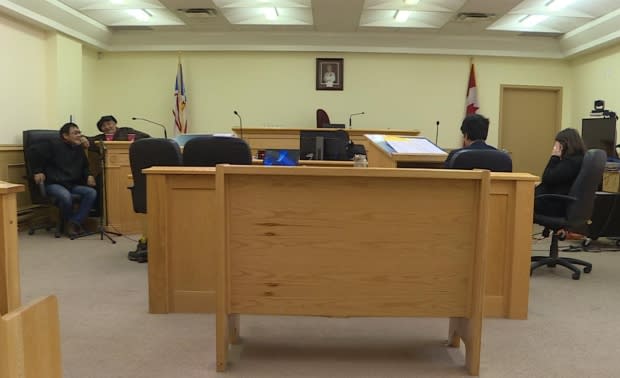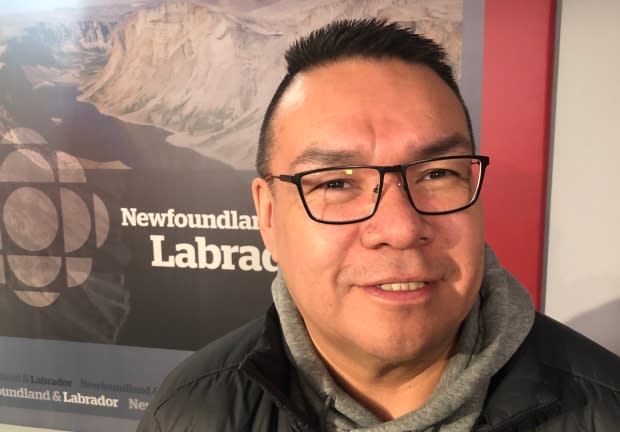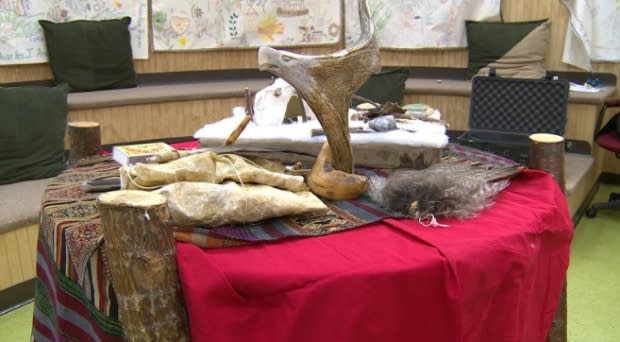Innu court interpreters underpaid, Sheshatshiu's justice co-ordinator says
With language cited as a big barrier facing Innu people that are going through the justice system in Labrador, the Sheshatshiu Innu First Nation (SIFN) says keeping courtrooms staffed with Innu interpreters is no easy task.
"Right now, there are a lot of files of First Nation people from here, from Natuashish and Sheshatshiu," justice co-ordinator David Penashue said.
"We had some people that tried to apply for it but they are having a hard time. They [needed] a babysitter to work there."
The band is funded by the province to provide key justice positions for Innu people.
An hourly rate paid through the courthouse for an on-call interpreter is $45 per hour and includes transportation and meal costs. The permanent position, which the band has been unable to fill for over a year, pays $40,000 a year and doesn't include fuel or food.
Penashue said the amount of money the band receives to fund the programs was put in place as part of a pilot project and it hasn't changed since 2008.
He said the low salary provides no incentive for people to take on the role and that it simply isn't a competitive job package for potential applicants.

In order to fill the permanent position, applicants must undergo a background check, which isn't necessary for a worker who signs on for the on-call position.
"For them, if they call somebody, they don't screen them, they just take them," Penashue said.
Court left scrambling
Sometimes, as CBC has witnessed at recent matters, the court is often scrambling to find interpreters for matters that have been scheduled long in advance.
In one instance, a trial — which had already faced several delays — was further delayed after someone realized the interpreter was less familiar with the Innu dialect in Natuashish than in Sheshatshiu.
We told the province we need help here and they need to do something. - David Penashue
"I know that the court, they're frustrated also, with the situation," Penashue said. "I see sometimes a year, over a year [of delays] because of translating."
The issue isn't just with interpreters, Penashue said, salaries are also low for their parole worker, their victim service worker and the Sheshatshiu Innu liaison officer at the Labrador Correctional Centre.
The band has requested funding from the provincial government to bring salaries up to a more competitive level, around $70,000-80,000 a year, without success.

"We have good workers, but they are asking for more," Penashue said. "We told the province we need help here and they need to do something."
The court currently does travel the north coast of Labrador, including Natuashish, on a circuit.
The Sheshatshiu First Nation has been requesting to be included in that circuit since 2013. Right now, anyone needing to attend a court matter has to travel 45 kilometres to Happy Valley-Goose Bay.

"That will help out also with translating stuff, right? To bring our court back in our community. Some people have no vehicle to go out there."
Government response
Newfoundland and Labrador's Department of Justice responded in writing to several CBC questions about Innu-Aimun interpreters and other SIFN justice positions.
"During times of fiscal restraint, the department is trying to work within already allocated budgets," the response from a spokesperson read.

"All positions are recruited for using predetermined qualifications including education [and] work experience."
The department said it provides $55,000 per year for the parole, interpreter and victim services positions, as well as $31,000 for a part-time prison liaison officer. Penashue said a certain portion of that funding goes toward administration costs.
"We are not aware of any matters delayed for one year because of any issues with interpretation," the statement read.
The department did not address the issue of the lack of a Mushua Innu First Nation liaison officer to care for inmates from Natuashish in the Labrador Correctional Centre, but did say at no time would the department deny cultural services to its inmates.
"The Prison Liaison Worker position, funded through SIFN, services the inmate population from both Innu communities."
Penashue had also expressed dismay that an interpreter course had not been held since 2008. The province said it is in talks with the College of the North Atlantic to offer an Innu interpreter program in 2019.
It said "assignment and distribution" of the province's circuit court lay with the chief judge of the provincial court. It referred to a 2012 review that sought to inform "best practices and realize efficiencies."
"[The review had] particular emphasis on the assessment of individual circuit caseloads, sitting times, collapse rates, proximity to other circuit locations and home courts, as well as operational costs," the Department of Justice statement read.
Read more articles from CBC Newfoundland and Labrador
